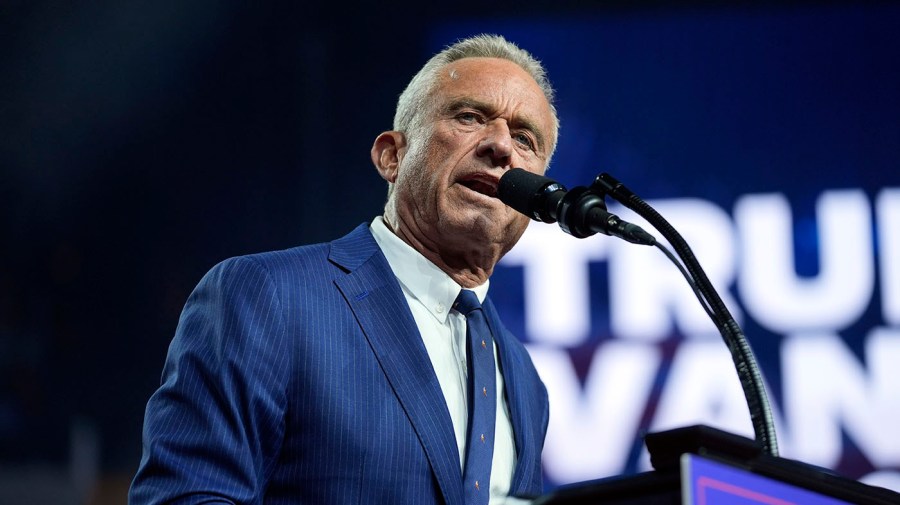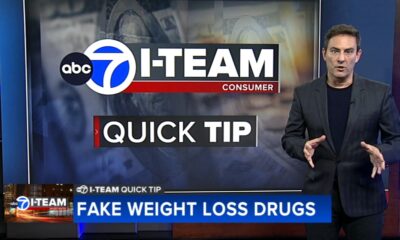Health
RFK Jr. Restricts COVID-19 Vaccine Access to High-Risk Groups

The U.S. Food and Drug Administration (FDA) has approved updated versions of the COVID-19 vaccines from Pfizer and Moderna, but has limited eligibility to high-risk groups. This decision, announced in September 2023, comes as health officials continue to navigate the ongoing pandemic and its varying impacts on different populations.
According to the FDA, the updated vaccines aim to provide enhanced protection against circulating variants of the virus. However, the new guidelines specify that only individuals deemed to be at high risk, such as the elderly and those with underlying health conditions, will be eligible to receive these shots. This move has sparked discussions regarding vaccine access and public health strategies as the nation approaches another potential wave of COVID-19 infections.
The FDA’s decision reflects a cautious approach to vaccination, prioritizing vulnerable populations while also addressing concerns about vaccine efficacy in the general population. The agency’s spokesperson stated that this targeted strategy is designed to focus resources on those most likely to benefit from vaccination, thus aiming to reduce hospitalizations and severe outcomes.
The approval of the updated vaccines is part of an ongoing effort to adapt to the evolving nature of the virus. Robert F. Kennedy Jr., a prominent figure in the vaccine debate, has voiced his criticism of the vaccine rollout, arguing that broader access to vaccines should be considered. His comments have reignited discussions about vaccine hesitancy and the importance of informed consent in public health initiatives.
The FDA’s updated guidance comes as the COVID-19 vaccination campaign has seen a decline in uptake. According to recent statistics, only a fraction of the eligible population has received booster doses, raising concerns among health experts about the potential for increased transmission during the colder months when respiratory illnesses typically surge.
As the situation develops, public health officials are urging individuals, particularly those in high-risk categories, to stay informed about vaccination options and to consult healthcare providers regarding their specific circumstances. By focusing on high-risk groups, the FDA aims to optimize the impact of vaccination efforts and safeguard the health of the most vulnerable.
The conversation surrounding COVID-19 vaccinations remains complex and multifaceted. The implications of the FDA’s decision will likely influence discussions about vaccine policy and public health approaches in the coming months. With ongoing research and monitoring, health authorities continue to evaluate the effectiveness of vaccination strategies in combating the pandemic.
-

 Technology4 months ago
Technology4 months agoDiscover the Top 10 Calorie Counting Apps of 2025
-

 Health2 months ago
Health2 months agoBella Hadid Shares Health Update After Treatment for Lyme Disease
-

 Health3 months ago
Health3 months agoErin Bates Shares Recovery Update Following Sepsis Complications
-

 Technology3 weeks ago
Technology3 weeks agoDiscover 2025’s Top GPUs for Exceptional 4K Gaming Performance
-

 Technology2 months ago
Technology2 months agoElectric Moto Influencer Surronster Arrested in Tijuana
-

 Technology4 months ago
Technology4 months agoDiscover How to Reverse Image Search Using ChatGPT Effortlessly
-

 Technology4 months ago
Technology4 months agoMeta Initiates $60B AI Data Center Expansion, Starting in Ohio
-

 Technology4 months ago
Technology4 months agoRecovering a Suspended TikTok Account: A Step-by-Step Guide
-

 Health4 months ago
Health4 months agoTested: Rab Firewall Mountain Jacket Survives Harsh Conditions
-

 Lifestyle4 months ago
Lifestyle4 months agoBelton Family Reunites After Daughter Survives Hill Country Floods
-

 Technology3 months ago
Technology3 months agoUncovering the Top Five Most Challenging Motorcycles to Ride
-

 Technology4 weeks ago
Technology4 weeks agoDiscover the Best Wireless Earbuds for Every Lifestyle





















